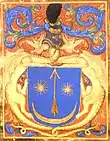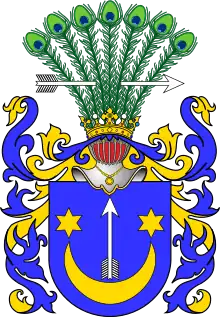House of Dragoș
The House of Dragoș,[1] also known as the House of Drăgoșești[2] (Hungarian: Drágfy, Drágffy, Drágffi, Drágfi), was founded by Dragoș[3][4] (also known as Dragoș Vodă[5] or Dragoș of Bedeu[6]), who was traditionally considered the first ruler[3] or prince of Moldavia and who was Voivode in Maramureș.[7]
| House of Dragoș (Drăgoșești) | |
|---|---|
 | |
| Country | |
| Founded | 1352: Dragoș, Voivode of Moldavia |
| Titles | |
Notable members
- Dragoș, Voivode of Moldavia
- Sas of Moldavia
- Giula of Giulești
- Balc of Moldavia
- Drág, Count of the Székelys
- Bartolomeu Dragfi (Bertalan Drágffy)
- John Drágfi
- Gáspár Drágffy (1506-1545), főispán of Közép-Szolnok.
- Anna Drágffy (1522-1527), spouse of Kristóf Frangepán / Frankopan (†1527), Ban of Croatia.
- Julianna Drágffy (1498-1500), spouse of András Báthori de Ecsed, Master of the cavalry (Lovászmester), főispán of Szabolcs et Szatmár.
Coat of arms and history
Voivode Dragoş I de Bedő voivode of Máramaros Prince of Moldavia[8] and his successor son Szász de Béltek Prince of Moldavia,[9][10] bore the blue (azure) escutcheon with the gold crescent, gold stars and gold arrow on their coat of arms.[9] Other notable scions of Dragoş I were Bartolomeu Drágfi of Béltek, Comes Perpetuus of Közép-Szolnok County (1479–1488), Voivode of Transylvania and Comes of the Székely people (1493–1499),[10] who had distinguished himself earlier as a royal knight of the Hungarian Royal Court defeating the Ottoman Turks at the Battle of Breadfield (1479) together with Pál Kinizsi, István Báthory, Vuk Branković and Basarab Laiotă cel Bătrân.[11] At the time of King Matthias Corvinus' death, Bartholomew Drágfi of Béltek was among the wealthiest landowners of the country, three castles, two manor houses, eight market towns and about 200 villages were in his property.[10] His estates in Közép-Szolnok and Szatmár counties included the castles of Kővár and Erdőd together with the large lordships surrounding them, and further, the castles of Sólyom and the castellum of Csehi.[10] Another important family member, among others, was John Drágfi of Béltek Comes of Temes County in 1525, who died 1526 in the Battle of Mohács.[11]

 Coat of arms of the Transylvanian-Saxon family Drágfi de Beltiug (Hungarian Drágffy de Béltek) scions of Dragoş I of Bedeu
Coat of arms of the Transylvanian-Saxon family Drágfi de Beltiug (Hungarian Drágffy de Béltek) scions of Dragoş I of Bedeu
References
- "Archived copy" (PDF). Archived from the original (PDF) on 2015-04-02. Retrieved 2015-03-22.
{{cite web}}: CS1 maint: archived copy as title (link), 22.03.2015 - http://dspace.bcucluj.ro/bitstream/123456789/48164/1/Pop%20Ioan%20Aurel-Genealogii%20maramuresene-2011.pdf, 22.03.2015
- Romanian: Proiect de hotarare Primăria Municipiului Sighetu Marmaţiei Nr. 5651/09.04.2014, 12.11.2014 - Klepper, Nicolae. Romania: An Illustrated History.
- Georgescu, Vlad. The Romanians: A History.
- Brezianu, Andrei and Spânu, Vlad (2007) "Dragoş Vodă (?–ca. 1353)" Historical Dictionary of Moldova (2nd ed.) Scarecrow Press, Lanham, Maryland, USA, pages 124-125, ISBN 978-0-8108-5607-3
- Spinei, Victor. Moldavia in the 11th-14th Centuries.
- Ro: http://www.probasarabiasibucovina.ro/Carti/IstoriaMaramuresului.pdf
- Vásáry, István (2005). Cumans and Tatars: Oriental Military in the Pre-Ottoman Balkans, 1185-1365. New York: Cambridge University Press. p. 158. ISBN 9780511110153.
- von Reichenau; von Czergheö; von Bárczay (1898). Siebmacher's großes Wappenbuch, Band 4, Der Adel von Siebenbürgen [Siebmacher's Great Armorial Book, Vol. 4, The Nobility of Transylvania] (in German). Nürnberg: Bauer & Raspe. p. 104.
- von Reichenau, von Czergheö und von Bárczay (1885–1893). Siebmacher's großes Wappenbuch, Band 4, Der Adel von Ungarn samt den Nebenländern der St. Stephanskrone [Siebmacher's Great Armorial Book, Vol. 4, The Nobility of Hungary inclusive the Lands of the Crown of Saint Stephen] (in German). Nürnberg: Bauer & Raspe. p. 1298. - Kovács, András (2012). Institutional Structures and Elites in Sălaj Region and in Transylvania in the 14th-18th Centuries (PDF). Vol. XXI, Supplement No. 2. Cluj-Napoca: Romanian Academy, Centre for Transylvanian Studies. pp. 43–45, 110.
- Joan cavaler de Puscariu - Date istorice privitoare la familiile nobile române (English: History of the Romanian Noble Families). Editura societății culturale Pro Maramures "Dragoș Vodă", Cluj-Napoca, 2003 (in Romanian).
- Prof. Alexandru Filipascu de Dolha și Petrova - Istoria Maramureșului (English: History of Maramureş), Editura "Gutinul" Baia Mare, 1997 (in Romanian).
- Wyrostek, Ludwik - Rod Dragow-Sasow na Wegrzech i Rusi Halickiej (English: Clan Dragow-Saxon in Hungary and neighbouring Galicia). RTH t. XI/1931-1932 (in Polish).
Sources
- C. Tóth, Norbert (2012). "Szász vajda utódainak felemelkedése és bukása. A család vázlatos története 1365–1424 között [The Rise and Fall of the Descendants of Voivode Szász: The Schematic History of the Family between 1365–1424]". In Hegyi, Géza; W. Kovács, András (eds.). A Szilágyság és a Wesselényi család (14–17. század) (in Hungarian). Erdélyi Múzeum-Egyesület. pp. 135–166. ISBN 978-606-8178-64-6.
- Horváth, Richárd (2012). "A bélteki Drágfiak és a királyi udvar kapcsolata a Hunyadiak korában [The family Drágfi of Beltiug (Béltek) and the Royal Court in the Hunyadis' time (1424–1490)]". In Hegyi, Géza; W. Kovács, András (eds.). A Szilágyság és a Wesselényi család (14–17. század) (in Hungarian). Erdélyi Múzeum-Egyesület. pp. 167–212. ISBN 978-606-8178-64-6.
- Neumann, Tibor (2012). "Drágfi Bertalan politikai szerepe II. Ulászló király idején [The Political Role of Bartholomew Drágfi in the reign of King Wladislas II]". In Hegyi, Géza; W. Kovács, András (eds.). A Szilágyság és a Wesselényi család (14–17. század) (in Hungarian). Erdélyi Múzeum-Egyesület. pp. 213–235. ISBN 978-606-8178-64-6.